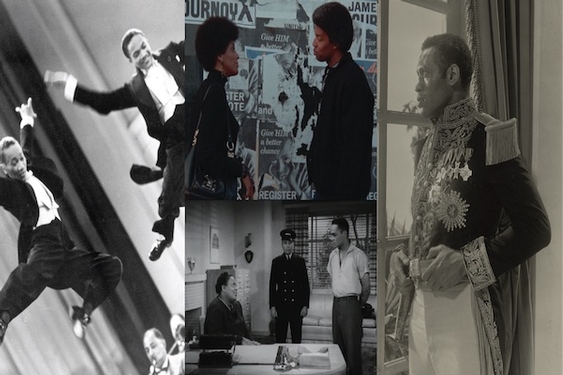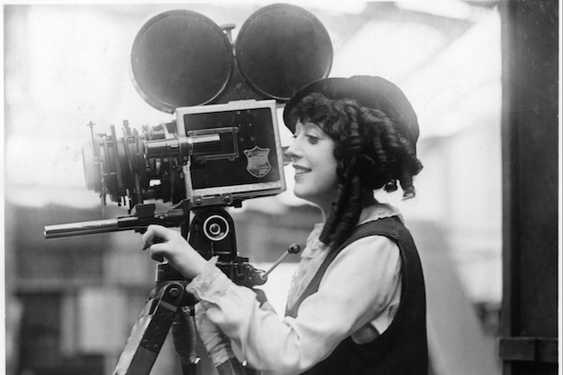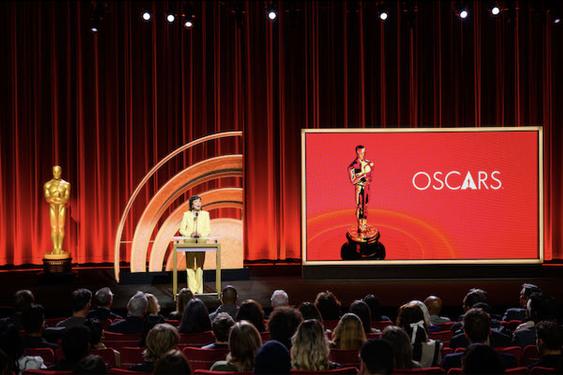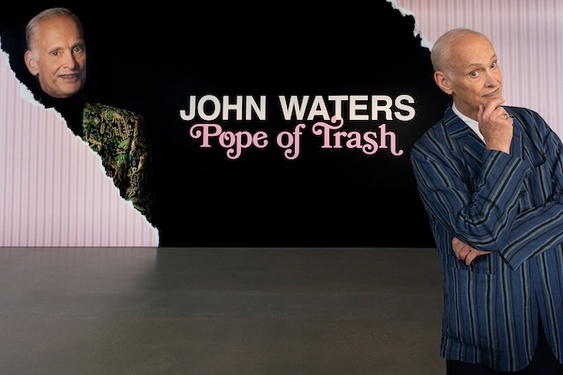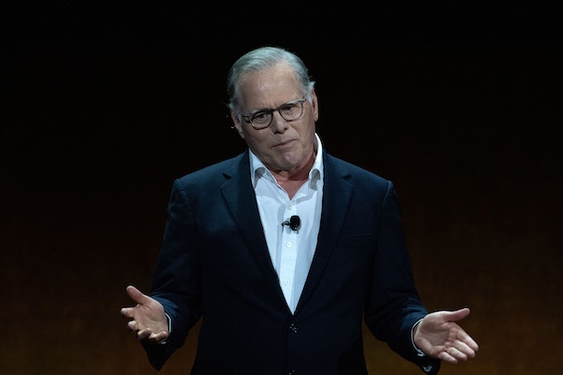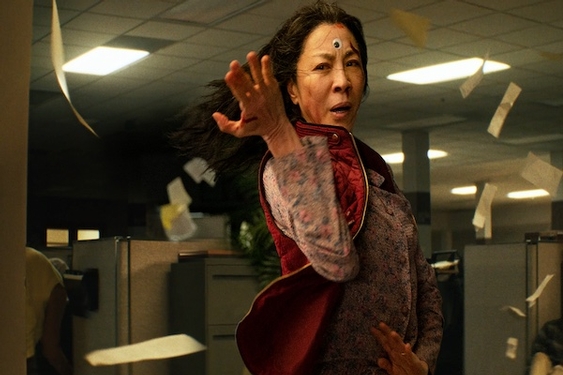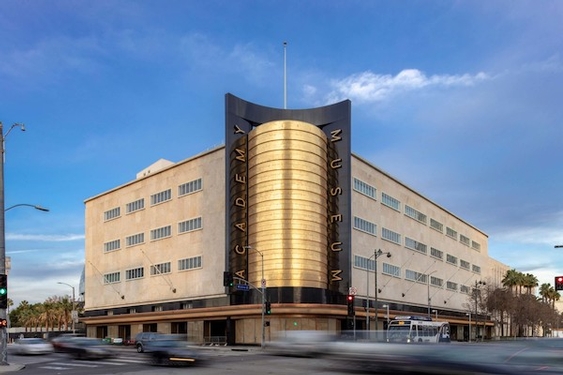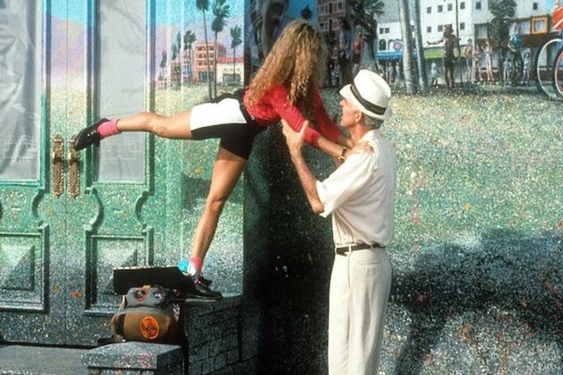The Academy Museum of Motion Pictures announced today details of its upcoming film programs including the first film series organized to accompany the landmark exhibition Regeneration: Black Cinema 1898–1971 on view August 21, 2022–April 9, 2023. These programs offer a survey of the films and filmmakers explored in Regeneration, an exhibition that expands our understanding of US film history by highlighting the work of African American filmmakers, including those who worked independently from the Hollywood studio system.
The first film series to accompany the exhibition—Regeneration: An Introduction—will kick off on August 25 with the world-premiere of a new restoration by the Academy Film Archive of the “lost” film Reform School starring Louise Beavers. This series runs until September 29 and will feature more than twenty screenings programmed by Bernardo Rondeau, Senior Director of Film Programs for the Academy Museum.
Covering the same 70+ year span as the exhibition, from cinema’s infancy in the 1890s to the early 1970s, the film series ranges from showcasing silent era pioneers such as writer-producer-director Oscar Micheaux’s dramas to the groundbreaking allegories of Spencer Williams and the independently produced, genre-defying works of innovators such as Melvin Van Peebles. Audiences will also be introduced to stars largely unknown to mainstream moviegoers—Ralph Cooper, Clarence Brooks, and Francine Everett—alongside iconic screen legends Paul Robeson, Josephine Baker, Harry Belafonte, Sidney Poitier, Lena Horne, and more.
“It’s been an amazing journey arriving to this first chapter of our film programming to complement the game-changing exhibition Regeneration: Black Cinema, 1898–1971, which offers a more expansive version of American film history,” said Rondeau. “The screening series will offer audiences the chance to discover the films highlighted in Regeneration, hopefully, deepening their experiences of the exhibition. It is incredible to be able to present films that have not been seen in decades, and I am thankful to our partners, especially the Academy Film Archive for their tremendous efforts in rediscovering and restoring a number of these films making them available like never before to new audiences.”
In addition to the inaugural film series Regeneration: An Introduction, the museum will launch additional film programming and screenings around Regeneration in late 2022 and early 2023 including world premieres of films newly restored by the Academy Film Archive—Harlem on the Prairie (1937) and Mr. Washington Goes to Town(1942); a centennial celebration of Dorothy Dandridge and Ruby Dee; screenings of silent films with live musical accompaniment; and a screening series by guest programmer Maya Cade to debut in February 2023.
Cade is the Creator and Curator of Black Film Archive and a Scholar in Residence at the Library of Congress. She has been awarded special distinctions by the New York Film Critics Circle and the National Society of Film Critics for the Archive. Her work has been featured in The New York Times, the Los Angeles Times, NPR, The Paris Review, and Vulture, among other publications. She is the fall 2022 programmer in residence at Indiana University’s Cinema and was the fall 2021 research fellow at Indiana University's Black Film Center & Archive. Originally hailing from New Orleans, Cade is based in Brooklyn.
Film screenings for Regeneration: An Introduction include:
Reform School
Thu, Aug 25 | 7:30pm | Ted Mann Theater
Louise Beavers gives a commanding lead performance as the crusading Mother Barton in this race film long believed to be lost, also known by its misleading re-release title Prison Bait. Beavers plays a probation officer who comes to the defense of young inmate Freddie (Reginald Fenderson) and his pals (the Harlem Tuff Kids) who are subject to constant harassment at a corrupt reform school. The film’s director, Leo Popkin, is one of the three co-founders of the Million Dollar Productions company that produced and distributed films for Black audiences. Its other co-founders were Popkin’s brother Harry and writer-producer-actor Ralph Cooper, “The Dark Gable.”
DIRECTOR: Leo C. Popkin.
WRITTEN BY: Zella Young.
CAST: Louise Beavers, Reginald Fenderson, Monte Hawley, Eugene Jackson.
1939. 82 min. USA. B&W. English. DCP.
Restored in 2020 by the Academy Film Archive with additional funding from the National Endowment for the Arts from a 16mm print donated by Giancarlo Esposito and Laurence Fishburne.
The Flying Ace
Sat, Aug 27 | 5pm | Ted Mann Theater
The charismatic Laurence Criner stars as Captain Billy Stokes—a World War I pilot who returns home to find both romance and a plot involving a gang of payroll thieves. The fact that Black Americans were not permitted to serve as pilots in the US Armed Forces in 1926 didn’t stop white writer-director Richard Norman from putting a valiant Black aviator at the center of this 1926 film. Norman’s roots in race films date to the drama The Green-Eyed Monster (1919), and his Jacksonville, Florida-based Norman Pictures was one of the leading producers of race films alongside the Lincoln Motion Picture Company and the Micheaux Film Corporation.
DIRECTOR: Richard E. Norman.
WRITTEN BY: Richard E. Norman.
CAST: Laurence Criner, Kathryn Boyd, Boise De Legge, Harold Platt.
1926. 65 min. USA. B&W. Silent. 35mm.
Preserved by the Library of Congress.
Musical score compiled from historic photoplay music by The Mont Alto Motion Picture Orchestra. Performed by Britt Swenson (violin), Brian Collins (clarinet), Dawn Kramer (trumpet), David Short (cello), Rodney Sauer (piano and score compiler). Mastered in HD from 35mm elements from the Norman Studios Collection, preserved by the Library of Congress.
The Emperor Jones with Princess Tam Tam
Sat, Aug 27 | 7:30pm | Ted Mann Theater
The Emperor Jones
Paul Robeson is pure magnetism in this fascinating film adaptation of Eugene O’Neill’s one-act play about a Caribbean dictator reflecting on his past as a Pullman porter in America. In the hands of independent producer-director Dudley Murphy—whose resume ranges from the avant-garde classic Ballet mécanique (1924) to Black and Tan (1929), which introduced film audiences to Duke Ellington—The Emperor Jones is a potent pre-Code parable about power, exploitation, and race. Though he had acted in silent films and on stage, Robeson makes his sound film debut as Brutus Jones and once audiences heard his distinctive baritone, a major star of the sound era was born.
DIRECTOR: Dudley Murphy.
WRITTEN BY: DuBose Heyward.
CAST: Paul Robeson, Dudley Digges, Frank Wilson, Fredi Washington.
1933. 80 min. USA. B&W. English. 35mm.
Preserved by the Library of Congress.
Princess Tam Tam
Arguably Josephine Baker’s most famous onscreen performance, Princess Tam Tam was the iconic expatriate’s second French film after her breakthrough Zouzou (1934) opposite Jean Gabin. Princess Tam Tam tells a Pygmalion-like story about a jealous French novelist who introduces a puckish Tunisian shepherdess (Baker) to Parisian society as a prank on his unfaithful wife. Baker gives a star-making performance—at times earthy and others pure glamour—though the film’s colonialist perspective remains problematic. Princess Tam Tam was not widely distributed in the US since it was denied the Production Code Administration’s Seal of Approval. The reason? The onscreen depiction of interracial romances.
DIRECTOR: Edmond T. Gréville.
WRITTEN BY: Pepito Abatino, Yves Mirande.
CAST: Josephine Baker, Albert Prejean, Robert Arnoux, Germaine Aussey.
1935. 77 min. France. B&W. French. 35mm.
Dark Manhattan with Murder in Harlem
Thu, Sep 1 | 7:30pm | Ted Mann Theater
Dark Manhattan
The first true Black gangster film, Dark Manhattan is the brainchild of its star and uncredited co-director, Ralph Cooper, also the founder of the Apollo Theater’s legendary Amateur Night. A compact and stylish crime saga about a teetotaling hood (Cooper) whose meteoric rise sends shockwaves to rival crews, the film offers a rich panorama of underworld figures and a charismatic lead role for Cooper to sink his teeth into. Despite being filmed entirely on the West Coast, the film evokes the electric energy of its namesake location.
DIRECTOR: Harry Fraser.
WRITTEN BY: George Randol.
CAST: Ralph Cooper, Cleo Herndon, Clarence Brooks, Jess Lee Brooks.
1937. 77 min. USA. B&W. English. DCP.
Preserved by the Library of Congress.
Murder in Harlem
Oscar Micheaux remakes his own silent film, The Gunsaulus Mystery (1921), in this expressionistic crime film set in a chemical factory. When the body of a white woman is found on-site, the murder is pinned on the Black night watchman on duty. But trailblazing Black lawyer Henry Glory (Clarence Brooks) has doubts and sets out to prove the man’s innocence. Inspired by a notorious crime that took place in the state of Georgia in 1913, Micheaux’s film remains a timely indictment of institutional racism.
DIRECTOR: Oscar Micheaux.
WRITTEN BY: Oscar Micheaux.
CAST: Clarence Brooks, Dorothy Van Engle, Andrew Bishop, Alec Lovejoy.
1935. 98 min. USA. B&W. English. DCP.
Restored in 2021 by the George Eastman Museum and Cineteca di Bologna in association with the Film Foundation, Quoiat Films and Sky, from a 35mm nitrate print in the SMU/Tyler Film Collection, SMU Libraries, deposited at the George Eastman Museum. Restoration was performed at George Eastman Museum Film Preservation Services and L’Immagine Ritrovata laboratory.
The Blood of Jesus with Hell-Bound Train
Fri, Sep 2 | 7:30pm | Ted Mann Theater
The Blood of Jesus
The prolific screen actor Spencer Williams also wrote, produced, and directed a series of independent films, shot in and around Dallas, with all-Black casts. The Blood of Jesus is the first of these—a religious allegory about a woman (Cathryn Caviness) who is trapped on the crossroads of the hereafter after being accidentally shot by her husband (Williams). A low-budget stylist, Williams’s rustic passion play, set in the contemporary world of juke joints, was one of the first Black-directed films named to the National Film Registry.
DIRECTOR: Spencer Williams.
WRITTEN BY: Spencer Williams.
CAST: Cathryn Caviness, Spencer Williams, Juanita Riley, Reather Hardeman.
1941. 68 min. USA. B&W. English. DCP.
Hell-Bound Train
A recent major discovery, Hell-Bound Train was made by self-taught 16mm filmmakers James and Eloyce Gist, African American evangelists who employed cinema as a tool for their traveling ministry. Their unique visual allegories were screened in churches and meeting halls, accompanied by a sermon and the passing of a collection plate. Decades before Snowpiercer (2013), the Gists use the cars of a doomed convoy as social metaphors—here the sins of the Jazz Age such as gambling, jazz, alcohol, and skipping church are staged in different train cars, all presided over by an eerily masked devil. Now featuring a newly created score by Dr. Samuel Waymon, best known to cineastes as having provided the moody music (and portrayed the minister/chauffeur) in Bill Gunn’s influential 1973 film Ganja & Hess.
DIRECTORS: Eloyce Gist, James Gist.
WRITTEN BY: Eloyce Gist, James Gist.
1930. 50 min. USA. B&W. English. DCP.
Stormy Weather with The Duke is Tops
Sat, Sep 3 | 7:30pm | Ted Mann Theater
Stormy Weather
Nearly retired tap dancer Bill "Corky" Williamson (screen and stage legend Bill “Bojangles” Robinson) recounts the welcome that he and his 15th New York Regiment band received when they returned from Europe after World War I—and the young lady he met that night—in this star-studded studio musical. Brimming with over twenty songs, Stormy Weather features performances from Cab Calloway; the Nicholas Brothers (Fayard and Harold), who defy gravity with a mind-boggling staircase dance routine; Fats Waller; and Lena Horne, who plays the young Corky’s girlfriend in a star-making performance.
DIRECTOR: Andrew L. Stone.
WRITTEN BY: Frederick Jackson, Ted Koehler.
ADAPTATION BY: H.S. Kraft.
CAST: Lena Horne, Bill Robinson, Cab Calloway, Katherine Dunham.
1943. 78 min. USA. B&W. English. DCP.
The Duke Is Tops
Lena Horne was only 21 when she made her screen debut as a Broadway-bound ingenue whose ascent mirrors the descent of her former producer and one-time beau Ralph Cooper. Punctuated by musical and dancing routines from almost forgotten performers such as the Basin Street Boys, Willie Covan, and Rubberneck Holmes, The Duke Is Tops also finds The Flying Ace (1926) star Laurence Criner giving a memorable turn as the flamboyant Doc Dorando.
DIRECTOR: William L. Nolte.
WRITTEN BY: Phil Dunham.
CAST: Ralph Cooper, Lena Horne, Laurence Criner, Monte Hawley.
1938. 74 min. USA. B&W. English. DCP.
Digital restoration courtesy of the UCLA Film & Television Archive.
Dirty Gertie from Harlem U.S.A. with The Girl from Chicago
Thu, Sep 8 | 7:30pm | Ted Mann Theater
Dirty Gertie from Harlem U.S.A.
Spencer Williams imagines W. Somerset Maugham's "Miss Thompson” as a Caribbean cabaret fable. While on the fictional island of Rinidad to escape her Harlem past, American Gertie LaRue (Francine Everett) becomes an object of fixation by locals and expats alike—among them a duo of pious missionaries and a sailor who goes by Tight Pants—when she debuts as a nightclub headliner. Williams himself stars in the bit part of the “voodoo woman” Old Hager, a gender-fluid character decades ahead of its time.
DIRECTOR: Spencer Williams.
WRITTEN BY: True T. Thompson.
CAST: Francine Everett, Don Wilson, Kathrine Moore, Alfred Hawkins.
1946. 60 min. USA. B&W. English. DCP.
Restored by UCLA Film & Television Archive and The Film Foundation, with funding provided by the Hobson/Lucas Family Foundation.
The Girl from Chicago
United States Secret Service agent Alonso White must go undercover in Mississippi on a classified assignment. There he meets and falls for the preacher’s daughter. Trouble is, she is being subjected to harassment from the same local crime lord Alonso was sent to investigate. The Girl from Chicago is punctuated by lively musical numbers. The film’s narrative looseness, further unmoored by the use of title cards, also lends the film the tone of a surreal dreamscape.
DIRECTOR: Oscar Micheaux.
WRITTEN BY: Oscar Micheaux.
CAST: Carl Mahon, Starr Calloway, Alice B. Russell, Eunice Brooks.
1932. 70 min. USA. B&W. English. Digital.
No Way Out with Native Son
Fri, Sep 9 | 7:30pm | Ted Mann Theater
No Way Out
Sidney Poitier was in his early 20s when he made his big-screen debut in this searing drama about a Black doctor who must provide treatment to a pair of racist brothers shot while committing a robbery. When one of the brothers dies in the care of Poitier, the other (Richard Widmark) accuses him of murder and writer-director Joseph Mankiewicz keeps ratcheting up the tension. An Academy Award®-nominee for Writing (Story and Screenplay) where Mankiewicz improbably competed against himself for his other release that year (All About Eve, for which he won), No Way Out also marks the first time that Ossie Davis and Ruby Dee appeared together on-screen. An unflinching look into the resolute face of racism, No Way Out remains all too relevant.
DIRECTOR: Joseph L. Mankiewicz.
WRITTEN BY: Joseph L. Mankiewicz, Lesser Samuels.
CAST: Richard Widmark, Linda Darnell, Stephen McNally, Sidney Poitier.
1950. 106 min. USA. B&W. English. DCP.
Native Son
Richard Wright stars in this hypnotically bleak noir adaptation of his own best-selling, controversial novel of the same name about Chicago chauffeur Bigger Thomas whose violent impulses and moral confusion are the inevitable result of generations of institutionalized racism. A lavish Argentinian production directed by Pierre Chenal, an exiled Belgian Jew, Native Son was made entirely outside the American film industry and was heavily censored when it originally screened in the United States. A complete 16mm print of the original Argentinian release and an incomplete 35mm duplicate negative of the uncensored cut were combined for the current restoration, the most complete version of the film ever shown in this country.
DIRECTOR: Pierre Chenal.
WRITTEN BY: Pierre Chenal, Richard Wright.
CAST: Richard Wright, Jean Wallace, Gloria Madison, Nicholas Joy.
1951. 104 min. Argentina. B&W. English. 35mm.
Preserved by the Library of Congress.
Odds Against Tomorrow with The World, the Flesh and the Devil
Sat, Sep 10 | 7:30pm | Ted Mann Theater
Odds Against Tomorrow
Harry Belafonte stars in this stylish noir that finds him squaring off against Robert Ryan, a tightly wound racist with a sadistic streak and dark past. The pair are thrown together by Ed Begley to commit a bank heist to repay their respective debts. With memorable supporting performances by Shelley Winters, Gloria Grahame, and Kim Hamilton; stunning high-contrast widescreen cinematography; a potent score by jazz pianist John Lewis; and a hard-bit tone of desperation, Robert Wise’s film was so beloved by French crime auteur Jean-Pierre Melville that it’s said he watched it between 80 and 120 times.
DIRECTOR: Robert Wise.
WRITTEN BY: Abraham Polonsky, Nelson Gidding.
CAST: Harry Belafonte, Robert Ryan, Shelley Winters, Ed Begley.
1959. 96 min. USA. B&W. English. 35mm.
The World, the Flesh and the Devil
Belafonte is one of the last survivors of a nuclear disaster wandering an eerily vacant Manhattan. When he finds fellow survivors, both white—played by Inger Stevens and Mel Ferrer, respectively—tensions surface. Loosely based on the 1901 novel The Purple Cloud, the film’s haunting premise is not so much the devastation and destruction of war but the racial and gender mores that somehow persist even as the world is ending. Rendered in striking black-and-white CinemaScope, The World, The Flesh and the Devil is an underappreciated cult classic. The film is also the first made in partnership with Belafonte’s own HARBEL productions.
DIRECTOR: Ranald MacDougall.
WRITTEN BY: Ranald MacDougall.
CAST: Harry Belafonte, Inger Stevens, Mel Ferrer.
1959. 95 min. USA. B&W. Scope. English. 35mm.
A Raisin in the Sun with The Learning Tree
Fri, Sep 23 | 7:30pm | Ted Mann Theater
A Raisin in the Sun
Lorraine Hansberry’s play about a family’s struggles to improve their status after the death of their patriarch was the first work by a Black female playwright to be produced on Broadway. Hansberry adapted her own work for this faithful film version which reunited nearly the entire stage cast, including such top acting talent as Claudia McNeil and Sidney Poitier as the clashing mother and son, Ruby Dee as Poitier’s wife, as well as Ivan Dixon, Louis Gossett Jr., and Diana Sands.
DIRECTOR: Daniel Petrie.
WRITTEN BY: Lorraine Hansberry.
CAST: Sidney Poitier, Claudia McNeil, Ruby Dee, Diana Sands.
1961. 128 min. USA. B&W. English. DCP.
The Learning Tree
Photojournalist Gordon Parks was the first Black person to helm a Hollywood studio production with this film, also his feature directorial debut. In his mid-50s at the time of its production, Parks renders his childhood in rural Kansas—don’t miss the nods to The Wizard of Oz (1939)—while adapting his semi-autobiographical novel of the same name. With gorgeous Panavision lensing by veteran noir cinematographer Burnett Guffey, Parks eloquently renders the story of young a boy who learns the hard lessons of first love (and sex), life, death, and racism.
DIRECTOR: Gordon Parks.
WRITTEN BY: Gordon Parks.
CAST: Kyle Johnson, Alex Clarke, Estelle Evans, Dana Elcar.
1969. 107 min. USA. Color. Scope. English. DCP.
La permission (The Story of a Three-Day Pass) with Nothing but a Man
Sat, Sep 24 | 7:30pm | Ted Mann Theater
La permission (The Story of a Three-Day Pass)
Melvin Van Peebles’s edgy, angsty, romantic first feature could never have been made in the United States. Unable to break into a segregated Hollywood, Van Peebles decamped to France, taught himself the language, and wrote several books in French, one of which, La permission , would be the source for his stylistically innovative feature debut. Turner (Harry Baird), an African American soldier stationed in France, is granted a promotion and a three-day leave from base by his casually racist commanding officer and heads to Paris, where he finds whirlwind romance with a white woman (Nicole Berger)—but what happens to their love when his furlough is over? Channeling the brash exuberance of the French New Wave, Van Peebles creates an exploration of the psychology of an interracial relationship as well as a commentary on France’s contradictory attitudes about race that is playful, sarcastic, and stingingly subversive by turns, and that laid the foundation for the scorched-earth cinematic revolution he would unleash just a few years later with Sweet Sweetback’s Baadasssss Song (1971).
DIRECTOR: Melvin Van Peebles.
WRITTEN BY: Melvin Van Peebles.
CAST: Harry Baird, Pierre Doris, Christian Marin, Nicole Berger.
1968. 87 min. France. B&W. French, English. DCP.
New 4K restoration by IndieCollect in consultation with Mario Van Peebles, with support from the Hollywood Foreign Press Association.
Nothing but a Man
Directed by expat Michael Roemer after an NAACP-funded three-month research trip to the American South, Nothing but a Man is an unforgettable piece of American independent cinema. Ivan Dixon stars as a railroad worker whose burgeoning activism threatens his relationship with a preacher’s daughter in a small rural town. Made amid the turmoil of the summer of 1963, which included the murder of civil rights activist Medgar Evers and the March on Washington, Nothing but a Man also introduces audiences to Yaphet Kotto in his screen debut and Gloria Foster, who later became known for playing The Oracle in The Matrix (1999).
DIRECTOR: Michael Roemer.
WRITTEN BY: Michael Roemer, Robert Young.
CAST: Ivan Dixon, Abbey Lincoln, Gloria Foster, Julius Harris.
1964. 92 min. USA. B&W. English. 35mm.
Preserved by the Library of Congress.
Sweet Sweetback’s Baadasssss Song with Black Chariot
Thu, Sep 29 | 7:30pm | Ted Mann Theater
Sweet Sweetback’s Baadasssss Song
A landmark of Black and American independent cinema that would send shock waves through the culture, Sweet Sweetback’s Baadasssss Song was Melvin Van Peebles’s second feature film, after he walked away from a contract with Columbia in order to make his next film on his own terms. Acting as producer, director, writer, composer, editor, and star, Van Peebles created the prototype for what Hollywood would eventually co-opt and make into the blaxploitation hero: a taciturn, perpetually blank-faced performer in a sex show, who, when he’s pushed too far by a pair of racist cops looking to frame him for a crime he didn’t commit, goes on the run through a lawless LA underground of bikers, revolutionaries, sex workers, and hippies in a kill-or-be-killed quest for liberation from white oppression. Sweet Sweetback’s Baadasssss Song ’s incendiary politics are matched by Van Peebles’s revolutionary style, in which jagged jump cuts, kaleidoscopic superimpositions, and psychedelic sound design come together in a sustained howl of rage and defiance.
DIRECTOR: Melvin Van Peebles.
WRITTEN BY: Melvin Van Peebles.
CAST: Melvin Van Peebles, Bruce Adams, Michael Augustus, John Allen.
1971. 97 min. USA. Color. English. DCP.
Black Chariot
Robert Goodwin wrote, produced, and directed this lost gem of American independent cinema. Opening during a tense meeting between members of an underground Black Power group that leads to a stunning foot chase, Goodwin’s film weaves past and present to tell the story of the social awakening of a character only referred to as “the drifter” (Bernie Casey). Shot on both 35mm and video and boasting a fierce, early performance from L.A. Rebellion icon Barbara O. Jones, Black Chariot is a fascinatingly iconoclastic revelation. Though world-premiered at the Santa Monica Civic Auditorium in 1971, Black Chariot has remained under-screened for decades—until now.
DIRECTOR: Robert L. Goodwin.
WRITTEN BY: Robert L. Goodwin.
CAST: Bernie Casey, Barbara O. Jones, Richard Elkins, Pauline Myers.
1971. 90 min. USA. Color. English. 35mm.
Collection of the Smithsonian National Museum of African American History and Culture, Gift of the family of Robert L. Goodwin Sr.
Preservation of Black Chariot made possible by a generous grant from the National Film Preservation Foundation. Additional funding by the Earl W. and Amanda Stafford Center for African American Media Arts (CAAMA).
About Regeneration: Black Cinema, 1898–1971
Regeneration: Black Cinema 1898–1971 explores the visual culture of Black cinema in its manifold expressions, from its early days to just after the civil rights movement. The exhibition is an in-depth look at Black participation in American filmmaking. Regeneration highlights the work of African American filmmakers and creates dialogues with visual artists while simultaneously expanding discussions surrounding US film history. Regeneration: Black Cinema 1898–1971 is co-organized by Doris Berger (Senior Director of Curatorial Affairs, Academy Museum) and Rhea L. Combs (Director of Curatorial Affairs, National Portrait Gallery).
Exhibition Credits: Regeneration: Black Cinema 1898–1971 is the recipient of the 2018 Sotheby’s Prize. The Sotheby’s Prize was founded to support and encourage museums to break new ground by recognizing curatorial excellence and facilitating an upcoming exhibition that explores overlooked or underrepresented art history. The Sotheby’s Prize was awarded by a jury of museum curators and directors comprising Sir Nicholas Serota, Donna De Salvo, Okwui Enwezor (1963–2019), Connie Butler, Emilie Gordenker, and chaired by Allan Schwartzman. Regeneration is made possible in part by major grants from the National Endowment for the Humanities. Technology solutions generously provided by Christie®. Lead support provided by Campari®. Generous support provided by the National Endowment for the Arts, J.P. Morgan Private Bank, the Los Angeles County Board of Supervisors through the Los Angeles County Department of Arts and Culture, and Octavia Spencer. Support also provided by Sybil Robson Orr, Daniel Allen Sims and Althea R. Miller-Sims, Lyndon J. Barrois Sr. and Janine Sherman Barrois, Chaz Hammel-Smith Ebert and Rogerebert.com, Morgan Freeman, Lori McCreary and Revelations Entertainment, Max and Kahlia Konan, Emma Koss, Alana Mayo, Mary Parent and Javier Chapa, Nina Shaw and Wallace Little, and Yeardley Smith. Exhibition programs are made possible in part by California Humanities, a non-profit partner of the National Endowment for the Humanities. Academy Film Archive restorations are funded in part by grants from the National Endowment for the Arts and the Capital Group Companies Charitable Foundation. Academy Museum Digital Engagement Platform sponsored by Bloomberg Philanthropies.


